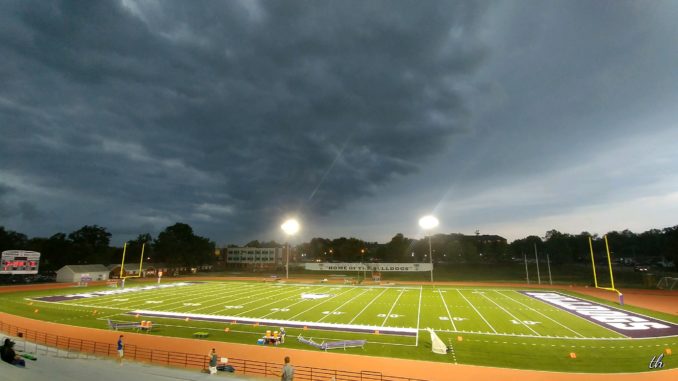
At 1:30 a.m., players and fans finally exited Stoke Stadium after a 27-11 loss to the University of Missouri Science and Technology Miners. The Family Day matchup was scheduled to kick off the Bulldogs’ 2017 GLVC schedule at 7 p.m., but the lightning-streaked skies had other plans. At about 9:20 p.m., the players emerged from the locker rooms for a brief warmup as the dedicated fans who had stuck out the delays flowed back into the newly-renovated Stokes Stadium to dry off a seat.
It was deja vu for athletics information director Kevin White. White said the last delayed game was in 2009 during the home opener against the Miners — coincidentally the last year the turf was replaced. That year, the turf had not been finished in time, and the game was relocated to Central Methodist University where it was eventually canceled and rescheduled as the last game of the 2009 season. This time, the freshly-placed turf was played on — regardless of the wait.
White said the GLVC policy states lightning must be at least an 8-mile radius for 30 minutes before athletes are permitted on the playing surface. He said the conference invested money in an app that will essentially detect any lightning strike within eight miles of the stadium — each strike automatically resets the timer. White said the timer shortened to two minutes Saturday night before a strike on the edge of the perimeter reset it. White said despite the frustrations, conference policy and safety were the main concerns of the night.
“We really weren’t in a position to call the game because we don’t know when we would have played them again,” White said. “Div. II doesn’t have a bye week so unless you just have an open date, you don’t have much flexibility.”
White said travel arrangements and hotel rooms also played a huge factor in the decision. Family weekend caused all Kirksville lodging to be full, and traveling teams require a lot of operation and planning. White said they had determined to play the game no matter what because of the referees and the weekly schedule.
And they did. The game was underway, and it was easy to forget that it was nearing midnight instead of the usual 10 p.m. So easy to forget in fact, that among the many distractions of the delay, no one remembered the stadium lights timing system. The lights are normally set to shine from 6:15-11:45 p.m. for night games, so in the middle of an S&T drive, the game went dark.
White said he had never thought they would be playing into Sunday morning, but as soon as it went dark, his staff immediately knew what had happened. After another 10-minute delay to heat the lights back up, the seemingly-never-ending game day wrapped to a close.
“We were grateful for the crowd that stuck it out,” White said. “We feel bad it happened on family night which is the biggest night of the year, and it really put a bind on the whole operations. With the storm hitting 30 minutes before game time, it was hard selling tickets or deciding on refunds, but our staff followed conference policies … Everyone did a great job, it’s just an unfortunate situation.”
